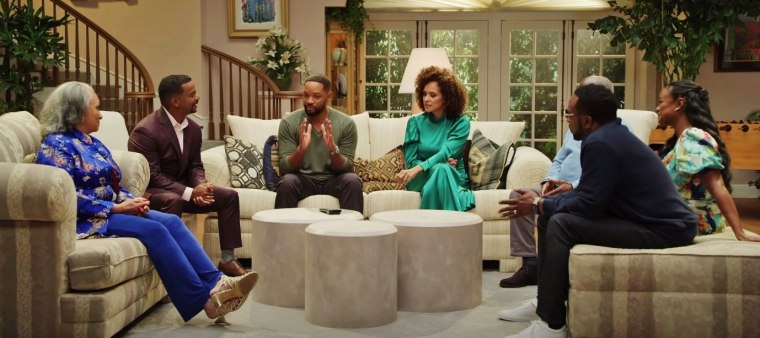Today, "The Fresh Prince of Bel-Air" is considered one of the best sitcoms of all time. Its success is so blinding that a recent New York Times piece asserts that when the show got its start in 1990, "networks, encouraged by the success of 'The Cosby Show' and the rise of hip-hop, were investing in sitcoms featuring Black actors."
Such praise, while well-intentioned, inadvertently glosses over just how trailblazing "The Fresh Prince" really was, a reality emphasized in HBO Max's highly enjoyable reunion special this week.
But in fact, when "The Fresh Prince" first aired, there was no "Living Single" starring Queen Latifah or "In The House" starring LL Cool J. "Martin" didn't premiere until 1992. The shows that did exist, like "Family Matters," which got its start on ABC in 1989, were more wrapped up in the standard sitcom tropes, only with Black casts. So such praise, while well-intentioned, inadvertently glosses over just how trailblazing "The Fresh Prince" really was, a reality emphasized in HBO Max's highly enjoyable reunion special this week.
While we now look back and can't imagine a world without "The Fresh Prince," the truth is it's kind of surprising the show was made at all. TV at the time was dominated by the three big networks — CBS, ABC and NBC. The 1990s have since become known as a high point for Black sitcoms, but when "The Fresh Prince" premiered, there were few if any comparable shows on CBS or ABC; the Peacock stood alone. In fact, NBC had something of a monopoly on premier Black sitcoms, with "The Cosby Show," "A Different World" and "The Fresh Prince of Bel-Air" all on its roster at the same time.
In the preceding decades, Black-cast classics like "Good Times," "Sanford and Son" and "The Jeffersons" existed, but TV was still largely for white people. Hip-hop was also far from the mainstream pop culture force it would eventually become.
The show's fish-out-of-water concept, as several critics of the time noted, wasn't new. But marrying hip-hop culture, fashion, humor, attitude and even rhymes was. And thus, a story about a Black kid from West Philadelphia sent to live with his wealthy uncle and aunt in Bel-Air became more than just another TV comedy. Instead, it became a vehicle to explore important issues facing the Black community that resonated within and outside the group. "The Fresh Prince" made it cool to be fly, normalizing a celebration of Black wealth — from head to toe — embraced with materialistic glee in rap songs but rarely in mainstream culture.
In the reunion, a win for fledgling HBO Max, Will Smith and his cast — DJ Jazzy Jeff, Alfonso Ribeiro (known in 1990 for his Michael Jackson Pepsi commercial and the hit sitcom "Silver Spoons"), Tatyana Ali, Karyn Parsons, Joseph Marcell and Daphne Maxwell Reid come together for an hour of memories and commentary that swing from humorous to poignant to powerful. The cast, better known as Jazz, Carlton, Ashley, Hillary, Geoffrey and the second Aunt Viv, look as personally connected today as they ever have. And though James Avery, who played beloved Uncle Phil, is no longer with us, his presence is strongly felt.
The way the show tackled race over its six seasons was subtle but still groundbreaking.
The way the show tackled race over its six seasons was subtle but still groundbreaking. In the reunion, cast members note how hard they worked to ensure that the show, despite being staffed with white writers, reflected a strong Black culture base. This is a burden recognizable to many Black Americans — the extra effort required just to be seen. Yet the "Fresh Prince" cast relays it with little acrimony. "Whenever we would come across moments that they wrote that [read] like 'this wouldn't happen — Black people don't do this,'" the cast, Ribeiro says, "made sure that we were authentic every episode."
Part of that authenticity included shedding light on police bias and systemic racism. "Part of the power of what we would always do with 'The Fresh Prince,'" says Smith, is "there would be very powerful ideas under the jokes and under the comedy."
James Avery, Ali notes, never failed to communicate their collective responsibility to present Black people on TV with dignity. Smith also credits Avery with pushing him to earn his title as an actor. His TV family agrees that he gave the show its Black artistic core, shaped in particular by his love of jazz. It's yet another reminder of how Black culture has long been suppressed and stereotyped — and one more example of how trailblazing "The Fresh Prince" really was.
Janet Hubert-Whitten's presence and acknowledgment as the original Aunt Viv is sobering, and it highlights the unique challenges Black women, especially those with darker complexions, face in Hollywood and the workplace at large. That she is there at all, considering her and Smith's decadeslong feud, is a holiday miracle. But it's an extremely pleasant one.
Reviewing the show for The Hollywood Reporter when it premiered, Miles Beller concluded that "The Fresh Prince" was "bubble gum rap, a sticky confection that runs out of flavor faster than you can rhyme 'flat' with 'rap.'"
Thirty years later, however, "The Fresh Prince" has done more than maintain its flavor. Perhaps the secret sauce that so many critics missed back then — and maybe even now — was a very rare sort of chemistry. (And Smith notes that recognizing chemistry has long been a superpower of his.) Ultimately, the cast's "excellence," Ali says, "was the way we loved each other." And the show's very tangible "Black joy" and "Black love" will likely ensure that "The Fresh Prince" remains a classic for generations to come.


